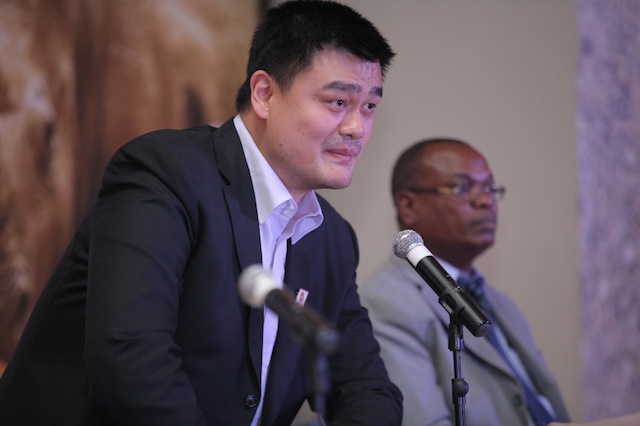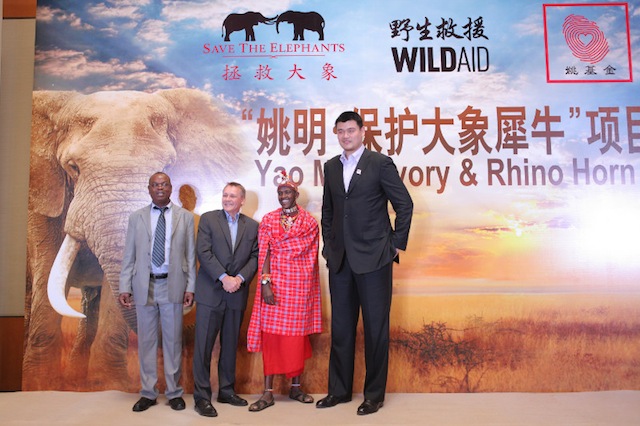Former NBA player and Chinese icon, Yao Ming, launches a major public awareness campaign against the sky-rocketing consumption of rhino horn and ivory in China. Partnered with WildAid (WA), Save the Elephants (STE), African Wildlife Foundation (AWF) and the Yao Ming Foundation, this initiative is taking a major step towards closing the bushveld slaughterhouse, once and for all.

‘We are facing the very real possibility that one day all of Africa’s rhinos will be extinct,’ said Dr. Philip Muruthi in Beijing during the campaign launch, ‘and as much as we greatly value the business partnership and investment of our Chinese comrades, today we invite the Chinese to also become our esteemed partners in conservation.’
In recent years, South Africa has been bearing the brunt of poaching: 668 rhinos have been killed in 2012 alone and this year’s death toll is well under way of setting a new record should current poaching trends persist. On 11 April the Department of Environmental Affairs confirmed 227 cases of poached rhinos for 2013. Losing this iconic African species will not only ‘be a global tragedy, but it would also mean the loss of hundreds of millions of dollars across the [African] continent,’ said Muruthi. The pachyderms are a key tourist attraction for visitors from all over the world.

In 2012, Ming spent 12 days scouting and filming in Kenya and South Africa on a mission to gather hard facts for his upcoming documentary. It is to be aired in partnership with Natural History New Zealand later this year. During his trip he experienced the two faces of wild Africa: a vibrant and beautiful one when he observed elephants roaming freely, and a darker and more disturbing one when later encountering the bodies of five poached elephants and one rhino. ‘Let us save rhinos together and never buy rhino horns. Because when the buying stops, the killing can too,’ said Ming.

‘The Chinese public may not realise it, but the demand for rhino horn in Asia leads to one rhino being violently killed roughly every twelve hours,’ explained Muruthi. Wildlife conservation safeguards biological and ecological diversity for both future generations and our own enjoyment of the environment today. It is of vital importance in providing not only protection against poaching but also a foundation for sustaining the integrity and diversity of ecosystems throughout the world. Arguably, not all people recognise its necessity as a key factor in preventing the ongoing decline of our planet’s wildlife populations.

The Chinese research company HorizonKey recently conducted two public surveys on elephant and rhino poaching, with revealing statistics for the three major cities of Beijing, Shanghai and Guangzhou. These are the findings:
– Over 50% of the nearly 1,000 participants do not think elephant poaching is common.
– One of three (33%) believes ivory is obtained from natural elephant mortality.
– Two of three (66%) are not aware that rhino horn comes from poached rhinos.
In both studies, over 90 per cent of the participants agree that the Chinese government should enforce the ban on ivory trade and take stricter action to prevent the use of rhino horn. ‘Because of the demand for ivory, poaching has erupted all over Africa,’ stated Daballen. Over 25,000 elephants are today poached and killed annually for their ivory, reaching a level seen only before the 1989 international trade ban.
Ming already led WA’s previous campaign against the use of shark fins for culinary purposes in China, which proved highly successful. It was credited with a reduction of 50 to 70 per cent in shark fin consumption. ‘Poaching threatens livelihoods, education and development in parts of Africa due to the insecurity it brings and loss of tourism it generates,’ said Ming, who is convinced that ‘when people in China know what’s happening, they will do the right thing and say no to these products.’ Peter Knights added that both ‘elephants and rhinos are conservation flagships, national icons [and] goodwill ambassadors. They are the pandas of Africa.’
The Yao Ming Foundation
The Yao Ming Foundation (YMF) was established in response to the devastating earthquake that hit Sichuan Province, China, on 12 May 2008. After more than 185 schools were destroyed, YMF committed to rebuilding five schools in the earthquake region. It also supports additional educational opportunities in both the US and China. To find out more about the initiative, visit http://theyaomingfoundation.org
To comment on this story: Login (or sign up) to our app here - it's a troll-free safe place 🙂.![]()






